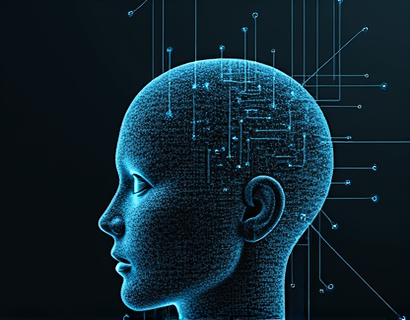Decentralized Organization Dynamics: Mastering the Advanced Software Stack for Universal Governance and Efficiency
In the rapidly evolving landscape of digital governance and decentralized systems, the concept of universal decentralized organizations has gained significant traction. These organizations leverage advanced software to redefine traditional hierarchical structures, fostering a new paradigm of governance, collaboration, transparency, and efficiency. This guide delves into the intricacies of how cutting-edge software can transform the creation and operation of decentralized organizations, providing enthusiasts and professionals with a comprehensive understanding of the tools and dynamics at play.
Understanding Decentralized Organizations
Decentralized organizations, often built on blockchain technology, operate without a central authority, distributing power and decision-making across a network of participants. This decentralized approach aims to eliminate single points of failure, reduce bureaucracy, and enhance trust among members. The core principle is to create a system where every participant has a stake and a voice, leading to more democratic and resilient organizational structures.
The transition from centralized to decentralized models requires a fundamental shift in how governance is structured and executed. Traditional hierarchical models rely on top-down decision-making, whereas decentralized organizations embrace a more collaborative and distributed approach. This shift necessitates advanced software solutions that can support complex interactions, ensure transparency, and maintain efficiency.
Key Components of an Advanced Software Stack
To build and sustain universal decentralized organizations, a robust software stack is essential. This stack comprises various components, each serving a specific purpose to ensure the organization functions seamlessly. The key components include decentralized identity management, smart contracts, decentralized storage, and communication protocols.
Decentralized identity management is crucial for verifying the authenticity and permissions of participants within the network. This component ensures that only authorized individuals can access certain parts of the system, maintaining security and privacy. By leveraging blockchain-based identity solutions, organizations can create a trustless environment where identities are self-sovereign and interoperable.
Smart contracts are self-executing contracts with the terms of the agreement directly written into code. They automate and enforce the rules and processes within the organization, reducing the need for intermediaries and minimizing the risk of human error. Smart contracts can manage everything from financial transactions to governance proposals, ensuring that all actions are transparent and immutable.
Decentralized storage solutions address the challenge of data management in a distributed environment. Traditional centralized storage systems are vulnerable to single points of failure and censorship. Decentralized storage, on the other hand, distributes data across the network, ensuring redundancy and resilience. This approach not only enhances data security but also improves accessibility and scalability.
Communication protocols are the backbone of any decentralized organization, facilitating seamless interaction among participants. These protocols ensure that messages are transmitted efficiently and securely, supporting real-time collaboration and decision-making. By using decentralized communication networks, organizations can maintain continuity and cohesion even in the face of network disruptions.
Enhancing Governance through Advanced Software
The governance of decentralized organizations is a critical aspect that determines their success and sustainability. Advanced software plays a pivotal role in enhancing governance by providing tools for proposal, voting, and execution of decisions. These tools ensure that the decision-making process is transparent, inclusive, and efficient.
Proposal systems enable members to submit and discuss ideas for improving the organization. These systems often include features for tracking the lifecycle of proposals, from submission to approval or rejection. By allowing open discussion and voting, organizations can harness the collective wisdom of their members, leading to more informed and widely supported decisions.
Voting mechanisms are essential for democratic decision-making in decentralized organizations. Advanced voting protocols ensure that each participant's vote is counted fairly and transparently. Techniques such as verifiable secret ballots and threshold signatures enhance the security and integrity of the voting process, preventing manipulation and ensuring trust in the outcomes.
Execution tools automate the implementation of approved decisions, ensuring that actions are taken promptly and consistently. These tools can interface with smart contracts to execute transactions, update system parameters, or trigger other automated processes. By automating the execution of decisions, organizations can reduce delays and minimize the risk of human error.
Collaboration and Transparency
Collaboration is a cornerstone of decentralized organizations, and advanced software significantly enhances this aspect. Decentralized platforms provide tools for real-time collaboration, allowing members to work together on documents, projects, and tasks. These tools often include features such as version control, access management, and activity logging, ensuring that all contributions are tracked and recognized.
Transparency is another vital feature of decentralized organizations, and software solutions play a crucial role in maintaining it. Blockchain-based ledgers provide an immutable and transparent record of all transactions and activities within the organization. This transparency builds trust among members and stakeholders, as everyone can verify the state of the organization at any given time.
Audit trails and reporting tools further enhance transparency by providing detailed insights into the organization's operations. These tools can generate comprehensive reports on financial activities, governance decisions, and project progress, making it easier for members to stay informed and engaged.
Efficiency and Scalability
Efficiency and scalability are essential for the long-term success of decentralized organizations. Advanced software stack components are designed to handle growing network sizes and increasing complexity without compromising performance. Here are some ways these components contribute to efficiency and scalability:
First, decentralized identity management systems are optimized for high throughput and low latency, ensuring that identity verification processes are swift and reliable. This efficiency is crucial for maintaining smooth operations as the network grows.
Second, smart contracts are designed to be highly efficient, executing transactions with minimal computational resources. By offloading repetitive and rule-based tasks to smart contracts, organizations can reduce the load on central nodes and improve overall system performance.
Third, decentralized storage solutions are built to scale horizontally, adding more nodes to the network as storage demands increase. This approach ensures that the system can handle large volumes of data without degradation in performance. Additionally, data sharding and other optimization techniques further enhance scalability.
Finally, communication protocols are engineered for high efficiency, using advanced algorithms to optimize message routing and minimize latency. This ensures that real-time collaboration and decision-making processes remain fluid and responsive, even as the network expands.
Challenges and Considerations
While the benefits of advanced software in decentralized organizations are significant, there are also challenges and considerations that must be addressed. Security remains a top concern, as decentralized systems are not immune to attacks and vulnerabilities. Continuous monitoring, regular audits, and community involvement are essential to maintaining a secure environment.
Interoperability is another critical aspect, as decentralized organizations often need to interact with other blockchain networks and traditional systems. Developing standards and protocols that ensure seamless interoperability is crucial for the widespread adoption and integration of decentralized organizations.
User adoption and education are also important factors. Complex software can be a barrier to entry, so providing intuitive interfaces and comprehensive documentation is necessary to encourage participation. Community support and training programs can help bridge the knowledge gap and foster a more inclusive ecosystem.
Future Directions
The future of decentralized organizations is promising, with ongoing advancements in software technology poised to address current challenges and unlock new possibilities. One area of focus is the development of more user-friendly interfaces and tools, making it easier for non-technical users to participate and contribute. This democratization of technology can lead to broader adoption and more diverse participation.
Another exciting development is the integration of artificial intelligence and machine learning into decentralized systems. These technologies can enhance decision-making processes, optimize resource allocation, and provide predictive insights, further improving the efficiency and effectiveness of decentralized organizations.
Lastly, the exploration of hybrid models that combine decentralized and centralized elements may offer a balanced approach, leveraging the strengths of both paradigms. Such models can provide the flexibility and resilience of decentralized systems while maintaining certain levels of control and efficiency.
In conclusion, advanced software plays a transformative role in the creation and operation of decentralized organizations. By enhancing governance, collaboration, transparency, and efficiency, these tools enable the realization of a new era of digital governance. As the technology continues to evolve, the potential for decentralized organizations to redefine how we structure and manage collective endeavors becomes increasingly compelling.










































